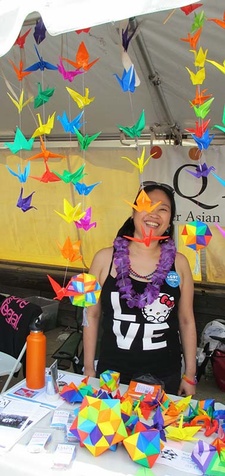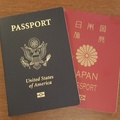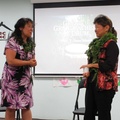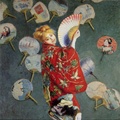Since today (October 11, 2013) is National Coming Out Day, I thought I’d take a page from the MTPC “I Am” project and share with you that not only am I Japanese-Okinawan-American, a lover of noodles & sweets, an avid crafter, and obsessed with purple—I’m also bisexual.
You might be wondering, “How is this relevant to a Japanese food & culture blog?” I would imagine that most people who haven’t been living under a rock know that the most famous Japanese American actor in history, George Takei, is wonderfully, fabulously gay. He’s so gay he once offered for people in Tennessee to use his last name as a synonym for the word “gay”. When I was looking around for famous LGB Japanese Americans to mention when I came out to my parents, he was the only one I came up with. About a year after it would have been helpful to me, The Huffington Post came out with a list of The Most Influential LGBT Asian Icons. There are 7 Japanese Americans (out of 54)—5 gay men, 1 lesbian woman, 1 transgender woman, 0 bisexuals. I wasn’t surprised, but I was disappointed. In short, LGBT Japanese Americans have a visibility problem. Some people say that sexuality should be private, but that’s only something people think when you’re not heterosexual. I used to agree that my sexuality was none of anyone’s business but by staying silent I contribute to LGBT Asian American invisibility.
Bisexuals of all colors have an even bigger visibility problem than gays and lesbians. If you’re in a relationship with someone of the opposite gender, people assume you’re straight and/or you “pass” for straight. If you’re in a relationship with someone of the same gender, people assume you’re gay. For half my life I chose to mostly pass as straight because I wasn’t out to my family and I figured it was just the path of least resistance. There’s this old Japanese proverb that translates roughly to, “The nail that sticks out will be hammered down.” Once upon a time I wanted kids and at 20, when I first fell in love with a woman, the idea of bucking societal norms, going the sperm donor/in-vitro route, upsetting my Evangelical Christian family and probably getting disowned was just too overwhelming for me to contemplate. So I stuck with my boyfriend and let my parents think I was straight.
Eventually I got over wanting to procreate, Massachusetts legalized same-sex marriage, George Takei told the world he’s gay (Trekkies already knew), the It Gets Better Project was started, and I began to wonder if I’d had it all wrong. Why was I limiting my serious relationships to men? I can now legally marry anyone in my state and as the years go by, the number of states where I could do that keeps going up (this Gallup poll found that personally knowing someone gay or lesbian seems to make it more likely that a straight person will support gay marriage, which is a strong case for coming out). I decided it was time to stop masquerading as straight.
Frankly though, I never thought of myself as being “in the closet.” I’ve always been out to my closest friends and occasionally to co-workers. I even came out to a couple of my cousins years ago although we never spoke of it again. I have always been upfront with new partners about my sexuality. Since most of the important people in my day-to-day life knew, I felt like that was out enough for me.
I found the It Gets Better Project a month after it started when I was still trying to figure out how to come out to my parents. I remember searching for Asians and was disappointed with how few videos there were. Individuals were hard to find but as companies started jumping on the It Gets Better bandwagon, they usually had Asians in their videos, although they didn’t always address their Asian-ness. I have to give a shoutout to hanksterchen. I think his might have been the first video I came across that was directed at Christians. It led me to look for other videos addressed to Christians (and Jews, and even one Muslim kid) and what struck me the most was how many of them said basically, “Yeah, my family freaked out at first, but they eventually came around.” Sometimes that took years, but it showed me that change was possible and love wins out more often than I’d thought.
Back then I told friends that I would put money on my parents having a terrible reaction and me possibly being disowned. I’d based this on both vague and specific memories of what I’d been told when I was younger. There were a couple of hints that maybe things were different, but I was still pretty sure that religion would win out over the unconditional love that parents are supposed to have for their children. Thankfully, I was wrong.
Coming out to my mom was almost a non-event. After all my careful research and planning, instead of sending the letter I thought I’d write with a DVD I’d bought, I ended up blurting it out unceremoniously on the phone one night. She said, “Oh, I thought so.” In the top 10 possible reactions my mom could have had, that was nowhere near the list. I think my mom’s entire reaction could best be summed up as, “So what?”
I couldn’t have been more shocked. It turns out that the mom I’d been having fights with in my head for years was an imaginary person. I do think that if I’d come out when I figured it out nearly 20 years ago, it would have been a different story, but it turns out my mom has evolved along with much of the rest of America. After a brief bit of confusion in which I tried to get her to tell me how she thought she knew (there really was no answer), my mom spent the rest of the conversation telling me all the LGBT celebrity gossip she knew! (Who knew she knew that Meredith Baxter was a lesbian?!) My mom told my dad and he had a similarly blasé reaction.
After I came out to my parents, I found myself making different choices. I had already joined QAPA (Queer Asian Pacific-Islander Alliance), but I hadn’t gone to any events. About six months after telling my parents, I finally plucked up the courage to start going to events and decided to go to my first ever pride and volunteer at QAPA’s booth.
I’d never been to pride out of an irrational fear of being photographed or recorded and thus being outed to my family. Clearly the chances of this happening were slim, but I figured I had to do everything to minimize them. I also never felt any affinity with the images of pride I saw in the media. I couldn’t relate to drag queens, I didn’t want to see men in assless chaps, and let’s not forget that pride in most parts of the United States is very white. As far as I was concerned, these weren’t “my people,” so there was no reason to go. I’m also not proud to be bi—I just am bi. Going to a parade that appeared to be about celebrating my sexuality made no sense to me.
Ah, how naïve I was. I really can’t express the freedom and joy I felt at my first pride. It was like nothing I’ve ever felt before and it was the happiest I’d been in a long time. There was something special about going somewhere public where people wouldn’t automatically assume I was straight, where I could celebrate being me—all of me. The importance of pride was finally clear to me.
The most fascinating thing I learned about myself in the aftermath of coming out to my parents is just how much fear had guided so many of the decisions I’d made for nearly 20 years. Not only had I not gone to pride because I was afraid of being outed:
- I hadn’t applied for interesting jobs with LGBT organizations because I was afraid of being outed.
- I hadn’t engaged in any LGBT activism because I was afraid of being outed.
- I hadn’t come out to some friends and coworkers because I was afraid of what they would think and say about me.
- I hadn’t come out to my extended family because I was afraid of being misunderstood and judged and losing their love.
- At times I avoided my family because of my growing discomfort with allowing them to think I was straight.
- I avoided all popular social networking sites out of fear that my friends’ identities and interests might out me to my family.
- I hadn’t allowed myself to have serious relationships with women because I was afraid of being disowned.
- I hadn’t taken a chance on that woman I fell in love with years ago because I was afraid of society. I wanted to live the heteronormative dream with a husband, 2 kids, a house with a picket fence, and a cat and bunny who were going to be best friends.
- Oh, and I refused to embrace rainbows because I thought it was stupid and I didn’t feel like I was part of the LGBT community. That and I was afraid it might out me.
That was when I finally understood that all those years I’d spent thinking I was out enough, I really was in the closet. It was a real shock because I’d always believed (or perhaps just told myself) that I was living a free and open life. After figuring all this out I told myself that my new motto was going to be, “Be brave! Don’t let fear guide you.” Then I thought about posting this last year, but I chickened out. Baby steps… :)
One of the ridiculous misconceptions that bisexuals still have to deal with is the fact that we shouldn’t be bi because we could “choose” to be straight. We must just be confused. Other people urge us to admit we’re really gay because they think we’re confused, afraid, or ambivalent about our gay identity. I’ve never understood why it’s so difficult for both gays and straights to understand that being bi is perfectly natural for us. It’s true that some gay people struggling with their sexuality will temporarily believe they are bi and plenty of young people experiment before figuring out that no really, they’re straight or gay, but for some of us, there’s no choosing. That would be like saying I could choose to be only American and not Japanese. I like both Hello Kitty and Tuxedosam. I don’t have to pick.
My sexuality has nothing to do with any traumatic incident in my past, how I was raised (conservative Evangelical Christian for the record), my relationships with either of my parents, or whether I was dropped on my head as a baby. It is simply who I am. What I did choose was to mostly stuff myself into a heteronormative box for years because I was afraid—because I didn’t want to be the nail that stuck out. Now I see that was a mistake.
In the Asian American community we also have the added problem that some parents believe that being gay is a white thing. (Actually, it’s not just Asians.) Same-sex attraction isn’t new. Barriers to coming out can include a language barrier with our parents and Asian cultural values of maintaining family honor (because being LGBT is seen as shameful), putting the needs of the family/community first by conforming to familial and societal norms and expectations, and the importance of respecting your elders.
I should stress that all I want to do today is share my story, not dictate what anyone else should do. LGBT people stay in the closet for a variety of reasons. Especially for young people still living at home & college students being supported by their parents, safety, housing, financial dependence, and religion (their family’s and/or their own) are all important considerations when thinking about the right time to come out. Even if you’re financially independent and living on your own, safety has to be considered.
I’ll close with a quote I really like from my friend the Rev. Patrick S. Cheng, and a few resources I shared with my extended family when I came out to them.
“Homophobia is not a family value, it’s not a religious value, and it’s not an Asian American value. Love is.”
Resources
No Shame! Talking About the Gay/Lesbian/Transgender Japanese American Experience In Hawaii Part 1, Part 2, September 12, 2010.
Equally Speaking, an Equality Hawaii Foundation forum about the people, places, and things affecting Hawaii’s LGBT community, Episode 14: Biblical “Clobber” Texts. Aired: July 31, 2011.
Some documents from SoulForce, a non-profit that works to end religious and political oppression of LGBT people:
- What the Science Says and Doesn’t Say about Homosexuality
- What the Bible Says and Doesn’t Say about Homosexuality
* * * * *
If any of my friends who didn’t know are reading, I apologize for not speaking with you directly. I probably never told you because it’s never come up and I couldn’t figure out how to tell you. If you have any questions, please feel free to call or write.
If you’re a reader I don’t know and have respectful questions, please feel free to leave a comment.
Part 2: LGBT Resources
Part 3: Well-known LGBT Japanese Americans
*This article was originally published on the author’s blog, Japanese-American in Boston, on October 11, 2013.
© 2013 Keiko K.






